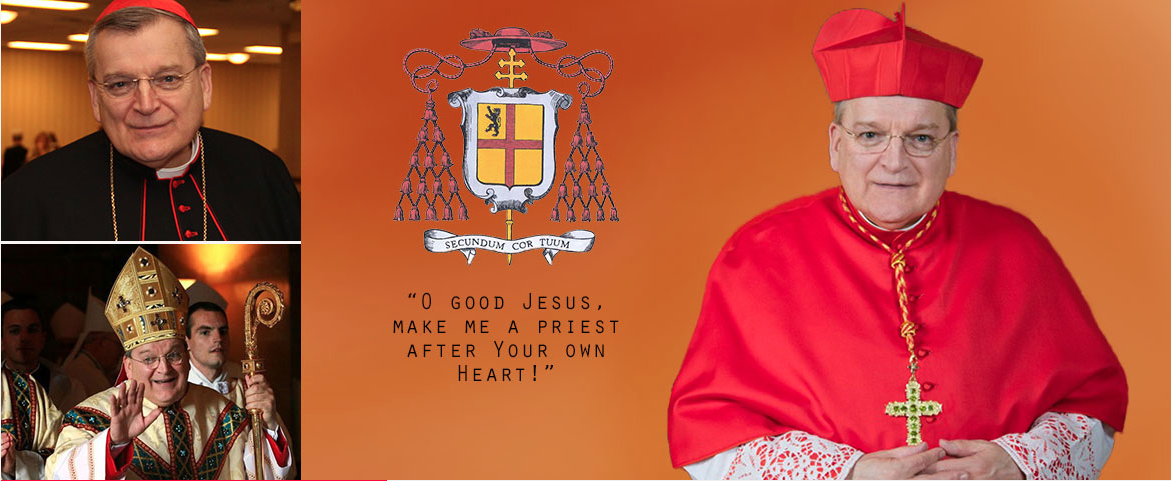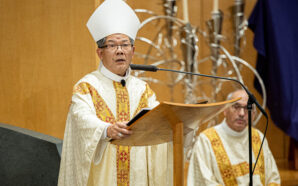His Eminence, Raymond Leo Cardinal Burke gave Catholic Outlook’s journalist, Jordan Grantham, the privilege of an exclusive wide-ranging interview on current issues faced by the Church regarding His Eminence’s work with the Holy Father, the media, Amoris Laetitia and the dubia.
Cardinal Burke has made two memorable visits to Australia, first in 2011 as guest of the Australian Catholic Students Association and secondly, in 2014, to make keynote addresses and say significant public liturgies, attended by people in Sydney and Melbourne.
The powerful influence of online social media comments, unaccountable media commentary and anonymous websites mean Australian Catholics could be susceptible to false ideas about Pope Francis and Cardinal Burke. News thrives on conflict; the status quo and complexity do not sell newspapers nor drive online traffic.
Over years of reporting, many falsehoods created a simplistic media representation of Cardinal Burke. Some facets of this representation include:
- Characterisation of events to the effect that His Eminence was “exiled” from the Vatican
- Rumours that His Eminence opposes His Holiness and is disobedient to him
- Statements that His Eminence is an “ultra-traditionalist” resister of the liturgical changes after the Second Vatican Council
- Suggestions that His Eminence is “rigoristic”, unpastoral and removed from the people
Contrary to such claims, His Eminence continues to play an important role as a member of the Congregation for the Causes of the Saints, among other members such as Cardinals Amato, Rylko, Sarah, Koch, O’Brien, Harvey and others. He also was the longest serving Prefect of the Supreme Tribunal of the Apostolic Signatura since Cardinal Dino Staffa’s term ended in 1977.
His Eminence professes loyalty toward the Holy Father, Pope Francis, celebrates the ordinary form of the Roman Rite, has extraordinary pastoral sensitivity and experience, and continues a full program of pastoral assignments around the world.
Jordan Grantham:
Your Eminence, thank you for the privilege of this interview, what does the media misunderstand about the Holy Father?
+Raymond Leo Cardinal Burke:
I think one thing that they misunderstand is that he’s the agent of some revolution in the Church, but the successor of St Peter has nothing to do with revolutions. In fact, he has to do with maintaining the Church in unity with her long and constant tradition.
And they also see Pope Francis as somehow completely distinct from the centuries long tradition of the Church and Her teaching and practice and that isn’t possible either, because the Roman Pontiff is that principle of unity, unity which is not only present now, but unity with those who have gone before over the centuries. In fact, the two are one. When we are unified with the saints and especially with the great teachers of the faith along the centuries, then we also find unity with one another.
J: Do you think the representation of conflict between the two of you is overdone?
+R: Between Pope Francis and myself?
J: Yes.
+R: Yes, oh, I think so, quite so. It’s all a caricature. They depict Pope Francis as a wonderful, open person and there’s nothing wrong with that, but they depict me as just the opposite.
It’s meant in a certain way to advance their own agenda, but the Pope is actually not in favour of their agenda. They use this kind of technique to make it seem like he is and that’s fundamentally dishonest.
They’re making a caricature of someone who’s asking for clarity about certain matters, they’re saying ‘well, he’s the enemy of the Pope’ and he’s trying to build up opposition to the Pope, which of course isn’t the case at all.
I think one thing that they misunderstand is that he’s the agent of some revolution in the Church, but the successor of St Peter has nothing to do with revolutions. In fact, he has to do with maintaining the Church in unity with her long and constant tradition.
J: Are there some important distortions about yourself that you’d like to correct?
+R: There are various depictions; that I’m not pastoral, that I’m only interested in doctrine and law. And I believe that anyone who has had any experience with me as a priest or Bishop would say that I am very pastoral and in fact, I don’t see any contradiction between being pastoral and being faithful in announcing the Church’s teaching and following the Church’s law.
Secondly, that somehow I’m a person who’s out of touch with the times and living in the Middle Ages and so forth. I’m very conscious of the everyday culture in which we live, and I try to address it, but in a way that is full of compassion in the sense of addressing the Church’s teaching to the cultural situation and trying to lead the culture to a certain transformation, which is certainly needed, for instance in terms of respect for human life and respect for the integrity of the family and respect for religious freedom. These are just three very important examples of fundamental aspects of contemporary culture about which the Church offers direction.
J: What are some messages or parts of your image that you would like the media to focus on?
+R: In my encounters with people, whether it be in person or through writing, or through speeches, I’ve always tried to give them hope and lead them to reflect on the truth that Our Lord always remains with us in the Church. He is our chief priest and guide, and therefore we should have confidence in leading a Christian life. We should have hope in Him.
It’s the confidence that, if we do the Lord’s will, we will find what’s really for our happiness and also that we will do what is best for our neighbour and for our world. That’s the kind of message I’ve tried to convey.
Recently, I’ve published a book-long interview with the French author Guillaume D’Alançon. In French, the book is entitled Cardinal at the Heart of the Church but in English they chose to give the title Hope for the World.
I was very pleased by that because that is fundamentally the message of the book, and, if you read the conclusion of the book, I express what my hopes are for the Church and for the world. Basically, it is that everyone will come to know Jesus Christ, to love Him and to serve Him because this is what is for the greatest good of our world and us as individuals. [1]
“be confident that in the Church we are encountering Our Lord Jesus Christ”
J: What message do you share with Catholics worried about the state of the Church?
+R: Simply that we can be confident that in the Church we are encountering Our Lord Jesus Christ as He wants to come to us, until the final day, until the end of time when we come together in glory, and that, therefore, no matter what confusion or even divisions enter into the Church, we should never give up hope.
We should cling all the more faithfully to what the Church has always taught and practiced. And that way we will really save our own souls, with the help of God’s grace, which, of course, we must always be about.
But, at the same time, we will truly serve the good of our brothers and sisters and the good of our world. If we as Catholics live our faith, our relationship with Our Lord Jesus Christ with fidelity, with clarity, and with courage, we will be a tremendous leaven in the whole world for the transformation of our culture.
J: Thank you very much Your Eminence, that’s the core of the Gospel isn’t it?
+R: Yes.
J: Does that relate to your work in the Congregation for the Saints?
+R: Well, of course, it does, because it involves the intensive study of the lives of men and women, lay faithful, priests, Bishops, consecrated persons, along the centuries, especially those of more recent time.
Through that study, I see how the personal relationship with Our Lord through the sacraments and the teaching of the faith and the discipline of life, has lead people to become heroes, heroes of the faith and also of humanity.
And there are so many who really do go about their relationship with Our Lord to a heroic degree in different settings and that’s a cause of great encouragement to me. So that definitely has to do with the message that I want to convey.
They’re making a caricature of someone who’s asking for clarity about certain matters, they’re saying ‘well, he’s the enemy of the Pope’ and he’s trying to build up opposition to the Pope, which of course isn’t the case at all.
J: Are there some potential or recent Saints that have particularly inspired you in this work?
+R: One of the great cases that I worked on was the miracle attributed to the Venerable Fulton J. Sheen for his beatification. It was just so wonderful to read about the parents and then the friends and people in the hospital and so forth . . . the miracle involved a baby who, at birth, had been strangulated by the umbilical cord and didn’t breath for 61 minutes . . . and then through the intercession of the Ven. Fulton J. Sheen, the baby, all of a sudden, started breathing, and that in itself was a miracle. But the other miracle was that there was no brain damage even though the child hadn’t breathed for some 60 minutes. Normally speaking, there’d be tremendous handicaps.
That was very edifying for me and then to review the whole case. You see how the invocation of the intercession of a saint really does bring about miracles. People have faith in the intercession of the saints, through invoking the intercession of the Venerable Fulton Sheen. Through his intercession, God granted a great spiritual favour.
Also, not too long ago, I studied the cause for the canonisation of St José Sánchez del Río, the young teenager, who during the Cristero War in Mexico, when the Church was being so cruelly persecuted at the beginning of the 20th century, fought with the Christian army and then, when he was captured refused to deny his Catholic faith. In fact, he died calling out “Long Live Christ the King!” [¡Viva Cristo Rey!], “Long Live the Virgin of Guadalupe!” So, that also is a most edifying story for our time.
We should cling all the more faithfully to what the Church has always taught and practiced. And that way we will really save our own souls, with the help of God’s grace, which, of course, we must always be about.
J: Absolutely. And maybe such times aren’t so far away for the Western world. Last night I ran into a friend from Iraq who had been held hostage for about three days by Islamic extremists because he’s a Catholic. I find his story incredibly inspiring: that for three days, he was basically wondering whether he would live or die for his faith.
+R: I’m sure the grace of Christ touched his heart in a very profound way and produced this heroic witness.
J: It was reported that Cardinal Maradiaga was strongly critical of the dubia and the then Four Cardinals in a new book, wherein His Eminence wrote “Ordinary people are with the pope, this is completely clear,” which some have interpreted as meaning ordinary people support heterodox interpretations of Amoris Laetitia.
Does this reflect your experience? Is part of the problem of current divisions a social problem, where people self-select their social circles?
+R: Yes, I think what Cardinal Maradiaga says doesn’t match my experience.
I find universally that there’s a great deal of confusion, also people feeling that the Church is not a secure point of reference. Some are feeling even a certain bewilderment . . . they are looking for a much stronger presentation of the Church’s doctrine.
Certainly, as good Catholics they love the Pope with complete obedience to the office of Peter. At the same time they don’t accept these questionable interpretations, as you put it, of Amoris Laetitia, interpretations, which in fact contradict what the Church has always taught and practiced.
There isn’t clarity about these matters. These people are in a very difficult state. It’s demonstrable, it’s a fact that we have conferences of Bishops which are contradicting one another with regard to Amoris Laetitia, Bishops contradicting one another; we have lay faithful who argue with one another over this; and so many priests are suffering in particular because the faithful come to them, expecting certain things that are not possible because they’ve received one of the these erroneous interpretations of Amoris Laetitia. As a result, they don’t understand the Church’s teaching anymore.
So, I think your point is very well taken. You know that in the Church, we have only one guide, the Magisterium, the teaching of the Church, but we now seem to be divided into so-called political camps. Also, even the language that’s used is very mundane and that concerns me a great deal.
“Long Live Christ the King!” [¡Viva Cristo Rey!], “Long Live the Virgin of Guadalupe!”
J: Is there a way to have positive dialogue among people, including those who don’t want to hear the constant teaching of the Church, and express fury at people willing to discuss and explain it?
+R: The thing that I find rather consistently is that so-called liberal people, the people who call for revolution in the Church and so forth are liberal and want dialogue as long as you agree with them. The minute you raise a question, they become very dismissive, make personal attacks, what we call ad hominem arguments, and so forth. That really isn’t helpful. We’re talking about truths, we’re talking about facts and there’s no place for these kinds of attacks.
J: People see these personal attacks and think they’re a valid response, a counter-strike, as if the truth depended on force.
+R: It’s a very mundane way of approaching things, it has no place in the Church, but that’s where we’re at right now. People even making disparaging commentaries on other people, when they don’t agree with them.
Well, my point is this: ‘What is it that I’ve said that isn’t true?’ And I’ll address it. If you simply accuse me of being ‘out of tune’, ‘out of touch’, or whatever, ‘medieval’, or deluded, there’s no response to that.
J: That doesn’t serve the truth. Are there any ways people can break down the personal barriers that seem to exist? That’s almost prior to the doctrinal issues.
+R: I think that there’s only one way for us to carry out a conversation about these matters and that is to make the point of reference the doctrine of the Church. That’s what unifies us.
It’s not me personally, I’m not the principle of unity in the Church, the Holy Father is as the teacher of the faith. So I think there just has to be a real effort to overcome this.
J: Is it all right if I ask whether you pray for the Cardinals or figures that attack you?
+R: Of course I do because they are Cardinals of the Church, they are positions of tremendous responsibility. Also I have a certain fraternity with them as members of the same College, the College of Cardinals, so that goes without saying.
I’m not the principle of unity in the Church, the Holy Father is as the teacher of the faith. So I think there just has to be a real effort to overcome this.
J: I was told that you normally celebrate the Mass in Latin using the Novus Ordo, is that the case, or true?
+R: I celebrate both forms of the Mass and oftentimes privately I do celebrate the Extraordinary Form.
J: Just briefly touching on the crisis in the Order of Malta, are there any more details you want to share in that? It seems the situation really imploded. Were you shocked by what happened?
+R: Yes, I was completely shocked by it, and I remain concerned that a true reform of the Order take place, a reform which respects its centuries-long history and respects the inspiration which the Holy Spirit gave to Blessed Gerard when he founded the Order for the Defence of the Faith and for the care of the poor. The foundation is the Defence of the Faith, and this scandal involving the distribution of contraceptives must be addressed in an effective way so that the Order doesn’t become simply a government agency but remains an agency of Christ Himself. When people receive charity from the Order they recognise first of all that this is coming from Our Lord Himself.
J: Do you think Fra’ Matthew Festing may have any recourse in canon law regarding a resignation under duress, or a perception of duress?
+R: Yes, he could in the sense that it was most extraordinary to demand from him, without announcing it to him beforehand, his resignation ‘on the spot’, as they say. It doesn’t seem that he intends to do that. That would have been a possibility.
J: To make the situation even more colourful, the Grand Master, who is also a Cardinal, of the Equestrian Order of the Holy Sepulchre is, I think, beyond the customary retirement age. Do you think you might become a Grand Master yourself?
+R: [Laughs] I haven’t even thought about that to be honest with you. I don’t know, I am a member of the Equestrian Order of the Holy Sepulchre, I’m very proud to be. But anyway, whatever is decided I would do.
I was completely shocked by it, and I remain concerned that a true reform of the Order take place, a reform which respects its centuries-long history and respects the inspiration which the Holy Spirit gave to Blessed Gerard when he founded the Order for the Defence of the Faith and for the care of the poor.
J: Or even Archbishop of Washington, D.C.? I think that might be coming up soon.
+R: I wouldn’t speculate on that.
J: How was your recent pastoral visit to Brazil?
+R: My pastoral visit to Brazil was most edifying. I was deeply impressed by the participation of persons of all ages – and especially of young people and young families with many children – in the presentation of the Portuguese translation of my book on the Holy Eucharist, Divine Love Made Flesh, and in the Pontifical Masses which I offered at Belém, Brasília, Rio de Janeiro and São Paulo.
The visit to the Sanctuary of Our Lady of the Immaculate Conception at Aparecida was a great gift of grace for me. Before the miraculous statue of Our Lady, I was able to pray for Brazil and for the faithful of Brazil. Also, I was blessed to offer the Holy Mass on an altar that had been used by Pope Benedict XVI.
J: Going back to your brother Cardinals, what do you think of the controversy regarding Cardinal Muller not being renewed as Prefect of the Congregation of the Doctrine for the Faith?
+R: I am not party to any information regarding the decision of the Holy Father not to renew Cardinal Gerhard Ludwig Müller in his office as Prefect of the Congregation for the Doctrine of the Faith. Certainly, Cardinal Müller is a most highly respected professor of theology who has published many books and articles in various languages. Because of his exceptional preparation and long experience as a professor of theology, he was particularly well suited to head the Congregation.
J: How does the death of Cardinal Meisner affect the plans regarding the dubia?
+R: The death of Cardinal Joachim Meisner on July 5th of this year and the death of Cardinal Carlo Caffarra on September 6th of this year mean that Cardinal Walter Brandmüller and I will take forward the important work of resolving the dubia.
While we are sad to have lost the earthly collaboration of these two great pastors and prelates, we are certain that they will continue to assist us with their prayers inspired by their enduring pastoral charity.
The urgency of a response to the dubia derives from the harm done to souls by the confusion and error, which result, as long as the fundamental questions raised are not answered in accord with the constant teaching and practice of the Church. The urgency weighs very heavily on my heart.
J: Is there an increased sense of urgency or isolation?
+R: The urgency of a response to the dubia derives from the harm done to souls by the confusion and error, which result, as long as the fundamental questions raised are not answered in accord with the constant teaching and practice of the Church. The urgency weighs very heavily on my heart.
J: Would you like to make a comment on the death of Cardinal Caffarra?
+R: Over the years, I was blessed by the friendship of Cardinal Carlo Caffarra, an outstanding priest and highly regarded scholar on the theology of marriage and family life.
During the past three years, I have worked very closely with him in defending marriage and family life from a growing confusion and even error, which have also entered into the Church.
In every encounter with Cardinal Caffarra, I was impressed with his purity of heart and with his totally priestly character. He loved Christ and His Mystical Body, the Church, with all his heart. For that reason, he suffered profoundly from the fact that the present situation of confusion and error in the Church has led to the grave harm of souls.
Nevertheless, he never questioned Our Lord’s presence with us, according to His promise to the disciples, and he never questioned the maternal intercession of the Virgin Mother of Our Lord.
[1] Burke, R. Hope for the World: To Unite All Things in Christ, 2016 (Ignatius Press: San Francisco):
“My hope is that the Church may be more and more faithful to her identity as the Bride of Christ in her teaching, in her worship, in her prayer and devotion, and in her moral life. My hope is that every branch of the vine, that every member of the Body of Christ, may become closer and closer to Christ and may know, love, and serve him, so that the glory of Christ may illumine our world, as we await His final coming, when he will return all creation to the Father, thus inaugurating ‘new heavens and a new earth’.”
[2] Minor details of the transcript have been edited for clarity.









